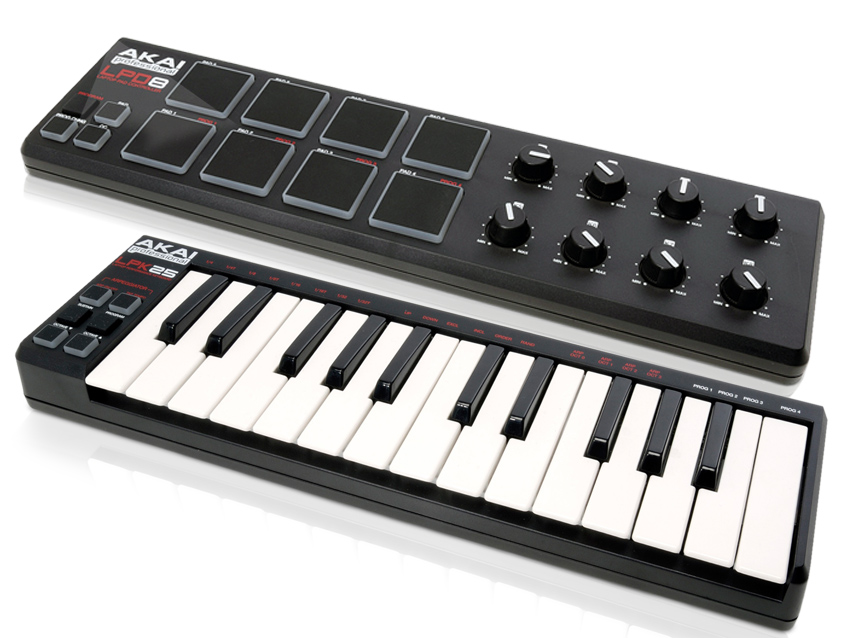MusicRadar Verdict
Akai's offerings provide seriously stiff competition in the increasingly packed mini controller market.
Pros
- +
LPD8 offers MPC-style pads and eight assignable rotary pots. LPK25 has proper mini keys and a built-in arpeggiator. Better build quality than Korg's nanoSeries.
Cons
- -
LPD8 knobs can be difficult to get hold of.
MusicRadar's got your back
Since its launch in 2008, it's fair to say that Korg's nanoSeries of mini controllers has taken the world by storm. This duo of Akai controllers will inevitably draw comparisons with Korg's models: the devices are designed to offer DAW/DJ software control in a tiny package.
The LPD8 Laptop Pad Controller slots in somewhere between Korg's nanoPad and NanoKontrol, with eight MPC-style pads and eight rotary pots, all of which have a 270-degree sweep rather than being infinitely adjustable 360-degree rotary encoders.
The LPD doesn't have the XY touchpad of the nanoPad or the faders of the nanoKontrol, meaning that a lot of the decision here will come down to personal choice in terms of what you need to improve your workflow. We can say, though, that the versatility of the LPD will make it suitable for controlling a wide variety of software.
The LPK25 Laptop Performance Keyboard is slightly larger than the NanoKey but offers the significant advantage of having much more realistic piano-style keys with a nicer feel than the Korg's flattened low-profile keys. Other than that, the overall idea is pretty similar, but the LPK's 25-key velocity sensitive keyboard does have another trick up its sleeve in the form of a built-in arpeggiator. Like the LPD8, it sends MIDI over USB and requires no external power or batteries.
In use
Akai is supplying the software for both units on 80mm mini CDs. Obviously this is in keeping with the miniaturisation theme, but it means that anyone with a slot-loading CD drive will need to make a trip to the Akai website to download the files. The software isn't actually required to use the controllers but comes in handy for programming and recalling setups.
The build quality of both units appears to be quite a bit higher than that of the Korg equivalents, with a sturdier, more stable feel. The LPD's pads are almost identical in use to those of the MPC range, with a sensitive touch that makes it easy to trigger hits at a range of velocities.
Although the keys are small and may be fiddly if you have big hands, the LPK is perfectly acceptable for coming up with ideas or playing simple parts. The arpeggiator is simple but effective, enabling you to create a variety of melodic patterns with minimal effort.
Our only major gripe with either unit is that the knobs on the LPD's rotary pots are too short, meaning that they're difficult to grab hold of. It's understandable that Akai has tried to keep the overall size of the unit down, but when you combine the knobs' size with their lack of knurled sides, it makes them much more fiddly to turn than they really need to be.
Summary
There are dozens of potential uses for the LPK25 and LPD8. The LPD8 in particular offers a handy combination of pads and rotaries which make it ideally suited for use alongside controllers such as Akai's own APC40 or Novation's Launchpad.
A further use would be to line the LPD8 up alongside a DJ software controller like the Vestax VCI-100, controlling effects, cueing, adjusting BPM or whatever you choose to map it to. In fact, the versatility that the LPD8 brings to the table makes it the pick of this pair for our money.
There are probably various minor improvements that Akai could make but ultimately at this price it's hard to argue. Those seeking more features should look elsewhere, but the convenience, build quality and value for money on offer here make the Akai mini controllers seriously attractive.
Future Music is the number one magazine for today's producers. Packed with technique and technology we'll help you make great new music. All-access artist interviews, in-depth gear reviews, essential production tutorials and much more. Every marvellous monthly edition features reliable reviews of the latest and greatest hardware and software technology and techniques, unparalleled advice, in-depth interviews, sensational free samples and so much more to improve the experience and outcome of your music-making.
“It’s about delivering the most in-demand mods straight from the factory”: Fender hot-rods itself as the Player II Modified Series rolls out the upgrades – and it got IDLES to demo them
“For some reason, the post office shipped your guitar to Jim Root of Slipknot”: Sweetwater mailed a metal fan's Jackson guitar to a metal legend
"No one phoned me. They never contacted me and I thought, 'Well, I'm not going to bother contacting them either'": Ex-Judas Priest drummer Les Binks has died aged 73











